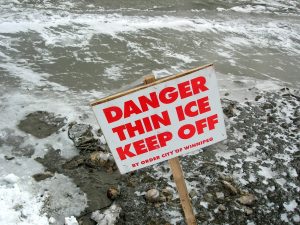8.1 Introducing: Risk!
![]() Risk: The chance of something happening due to factors or events that will have an impact on the achievement of goals or objectives. Risk is often measured in terms of likelihood and consequences, and can have both positive or negative effects.
Risk: The chance of something happening due to factors or events that will have an impact on the achievement of goals or objectives. Risk is often measured in terms of likelihood and consequences, and can have both positive or negative effects.
Risk: The chance of something going wrong.
People need to feel safe AND be kept safe when participating in recreation or leisure programs. When individuals register for recreation activities, they expect the recreation professionals to provide high-quality experiences with a low risk of personal injury. Willing participation is an expression of trust – trust that the recreation leaders, instructors or program-planners will diligently provide a Duty of Care – protection from the inherent emotional and/or physical harms associated with a specific program. For the program-planner, earning and keeping this trust occurs through a process known as Risk Management.

Simply put, recreation is risky. Risks of various kinds and severity are inherent in all recreation areas across formats. A child using a hot glue gun while crafting is risky due to the possibility of getting burned. Carrying a canoe over a rocky trail is risky due to the potential for a turned ankle or back strain. Supervising adults with wandering dementia while on an outing is risky, as someone might get lost if they slip away from the group.
One might ask – “If some activities are so risky, why do recreation professionals continue to offer them?” The answer is simple: Risk is attractive. Risk is exciting. For many, risk is a powerful motivator for engaging in recreation-based programs (Jordan & Degraaf, 2019, p.201)! Rather than avoiding risks, recreation professionals often intentionally incorporate risky elements into their programs because they know few people experience personal development or growth unless they go to the edges of what is comfortable and familiar.
The job of recreation professionals is to provide participants with opportunities to go to those edges with as little actual risk of injury or harm as possible. But how can one do this without taking all the risk out of programmed experiences, which might destroy the very character of the experience they provide (Jordan & Degraaf, 2019. p.201)? This is where Risk Management comes in.
What is Risk Management?
Risk Management is a planning process specific to individual organizations, constantly reviewed and updated by management and staff that outlines steps to minimize the undesirable risks found in the various programs conducted through parks, recreation, and/or leisure service organizations.
In its application, Risk Management is the effective management of potential opportunities for adverse effects in a given situation. It’s a decision-making process that considers all the possible results of unfortunate or unfavourable incidents or accidents. When risk is managed effectively, it can protect a recreation staffer’s professional reputation and also the organization they work for from lawsuits. Excellent Risk Management is an expression of Servant Leadership insofar as it serves the participant’s greater good. Risk Management is the thorough identification and evaluation of inherent and potential risks, as well as the careful selection and implementation of risk control strategies.
Effective Risk Management
- Draws people to attend programs and events (good reputation)
- Allows participants to feel safe from emotional and physical harm
- Develops client-provider trust and increases professionalism
- Decreases the chances someone is going to get hurt
We Manage Risks Because…
- We have a duty to protect our participants from foreseeable injury and harm.
- Doing so protects the reputations of recreation instructors and agencies
- This prevents those in positions of authority from abusing their power
- Having a formal plan in place to respond to incidents, accidents, and injuries reduces the chance of undesirable outcomes
- It saves money – getting sued can be expensive, even if the agency wins
- It creates great professional role models (just like you!)
People working in leisure services, sports and recreation need to be concerned and informed about how the law expects them to behave in carrying out their duties and managing the risk of injury (and death) to those under their care and supervision.
Risk Management Requires
- A basic understanding of some key legal principles
- Paying careful attention to a Risk Management process
- Ongoing commitment to the process by everyone involved
- A good dose of common sense

